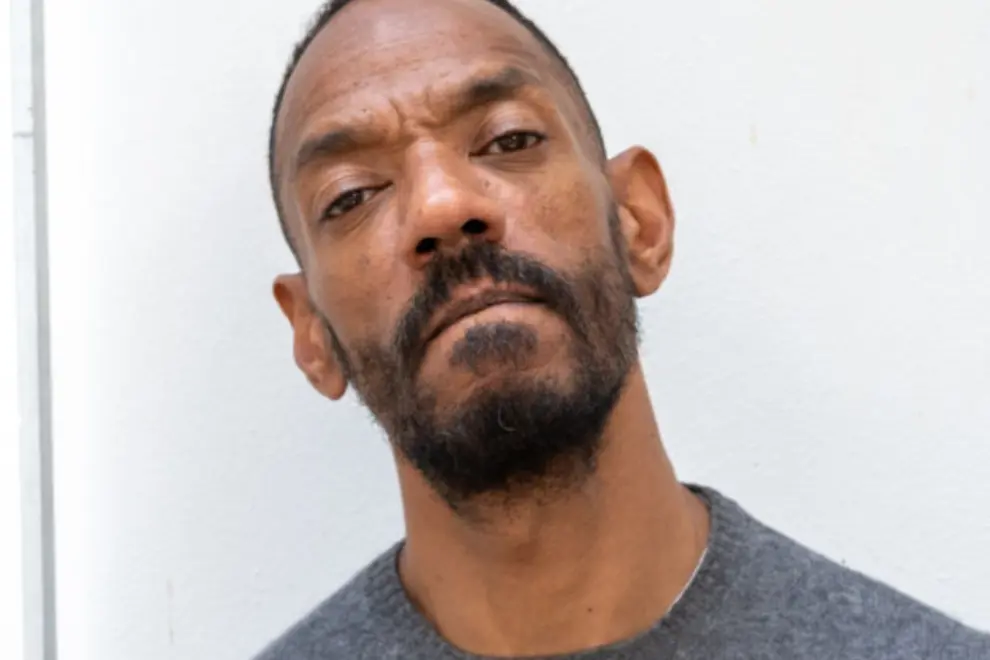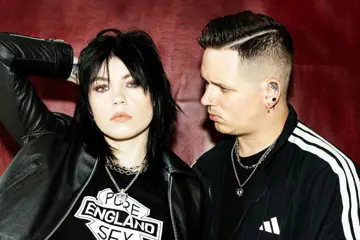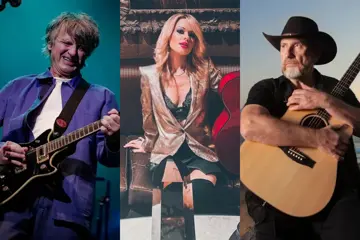The British music executive Darcus Beese rose through the hierarchy of the fabled Island Records to become the first Black President of a UK major label before assuming the dual position of President and CEO of Island Records US. He's launched icons like Amy Winehouse and enabled Drake to conquer the UK.
Early on, Beese worked with and befriended Tricky – the rock genius praising him in an interview conducted by Steve McQueen. In fact, McQueen, whose 12 Years A Slave took out an Oscar for 'Best Picture', later directed Mangrove (as part of 2020's film anthology series Small Axe) chronicling Beese's civil rights activist parents Darcus "Darco" Howe and Barbara Beese.
In 1970, the pair had been arrested on riot charges during a protest against the Metropolitan Police's racially motivated raids ("persecution") of The Mangrove, a Caribbean restaurant and community hub in Notting Hill. The Mangrove Nine won a landmark trial in Britain's judicial history.
"That is mad," Beese says of the coincidences. He remembers being a Tricky "fanboy" as the Bristolian emerged from Massive Attack with 1995's Maxinquaye. "He was a proper hero of mine –very few artists were. Groundbreaking!"
Don't miss a beat with our FREE daily newsletter
It's nine in the morning and Beese is Zooming from West London ahead of his inaugural Australian trip as BIGSOUND 2025 speaker in Meanjin/Brisbane – coffee mug in hand. The exec was notably involved in the success of Sydney's Dean Lewis, 2018's single Be Alright charting Stateside. "I have an affinity with Australia," he posits.
Beese is a generous, candid and digressive interviewee – the Brit's energy palpable as he reflects on his professional trajectory, values and ambitions. Beese often ends sentences with a "right?" and it's impossible to disagree.
Above all, the now independent mogul has developed a bold new vision in response to a music industry in flux. "I've been in the record business for over 35 years, and I didn't wanna wake up being in the record business anymore. I wanted to wake up being in the artist business."
ISLAND LIFE
Beese's story is circular – and his parents, both British Black Panthers, figure prominently. Beese's late Trinidadian father, Darcus Howe, gigged as a journalist, editor and broadcaster. But he's celebrated for his role in the Mangrove trial – the dub poet Linton Kwesi Johnson paying homage to him with Man Free (For Darcus Howe).
Astonishingly, Beese's great-uncle was CLR James, a West Indian historian, writer, postcolonialist theorist and cricket commentator. However, he highlights his maternal side – Barbara an ongoing inspiration.
"Funny enough, my mum and now me have family that migrated from Bristol to Australia – and they're in Melbourne," Beese reveals. "My mum was a 'coloured' child that was put in care post-war; daughter of a GI Joe, Black GI, that messed with a local Bristol girl." She "brought herself up," he says. "No one really knew of my mum."
The Fulham native describes himself as "a bit of a unicorn." Beese had a troubled adolescence and quit school early, starting his professional life in London hair salons. The "young Black boy" soon made music industry connections, ensuring a brilliant career off the streets. "I was able to go right instead of left." In 1989, he secured an internship at Island Records in the promotions department.
Chris Blackwell founded Island in 1959, introducing reggae to an international market by championing Bob Marley And The Wailers (not to mention the avant-garde Grace Jones).
Island expanded, establishing its rock credentials with U2, The Cranberries and PJ Harvey. Crucially, the label built a reputation for cultivating heritage acts. Beese joined Island when it was acquired by PolyGram. Yet, with Blackwell as mentor, he'd carry his legacy by eventually "stewarding" it.
The teaboy advanced to A&R Director – famously discovering a generational artist in Amy Winehouse. In 2008, Beese was appointed Co-President (alongside Ted Cockle), then five years later, President. In 2014, he was awarded an OBE (Officer Of The Order Of The British Empire) for outstanding services to the UK music industry. Four years on, Beese moved to New York to head Island Records US.
Beese reels off the stars he worked with at Island: U2, Florence + The Machine, Mumford & Sons, Drake, The Weeknd and Ariana Grande. "I think the DNA matched mine – and that was a place [where] I could grow and be fruitful and be successful, but also have a reason to turn up in the morning.
“Island gave you a blueprint to follow – to sell a lot of records, but to nurture and, if you can get the economics right, then curate culture. So it wasn't all about, 'Oh, let's sell culture, culture, culture.' It's like, 'No, you work in the music business, you sell records.'"
Indeed, Island was "able to take artists from the left and develop them to take [the] middle ground and therefore influence the marketplace," he explains.
Among those leftfield acts was the buzz George The Poet – "a [spoken word] poet with a message, a serious message, rooted in the politics and the culture of Black Britain and seen from a very educated lens."
Ironically, George intrigued another artist he pursued: Irish folk rocker Hozier, at the time blowing up with 2013's Take Me To Church. "I was trying so hard to sign Hozier," Beese recollects. "I had a meeting with him, and he was in my office, and we sat down, and we were talking, and you're doing all the things you're trying to do to convince a young man like Hozier to join the label."
Hozier noticed a poster for George The Poet's sold-out 2014 show with JP Cooper at London's Scala. "He said, 'Who's George The Poet?' and I went, 'Oh, he's a young Black boy that we signed – he's a poet.' 'You sign poets?' I said, 'Yeah, just like Linton Kwesi Johnson.'
“Back in the day, Island signed Linton Kwesi Johnson… Again, it was me doing what Island historically did – it was nothing different… He says, 'Will he sell records?' I said, 'Probably not.' He says, 'So why did you sign him?' I said, ''Cause sometimes people have just got stories to tell – and that's just as important as selling records.'
"That kind of above and beyond selling records – that's what Island Records was always to me. As long as you make the numbers, as long as you sell enough records, go tell your story. If you're not selling records, then culture is a luxury. And, because we were able to go and sell a lot of records, we were then able to go and curate culture."
DATAROCK
In 2018, Beese relocated to the US, where, especially amid the COVID-19 pandemic, "data and TikTok just exploded." At Island Records US, he faced unique corporate challenges. Its A&R was more mainstream with acts such as The Killers, Demi Lovato and a resurgent Sean Paul, but Beese emphasises, "We weren't as big as Interscope or Columbia or Republic or Warner."
He had to acclimatise. "We were losing deals left, right and centre. I just couldn't afford them. They were just going for millions and millions and millions of dollars. My A&R budget was like three-and-a-half million, and some of the deals were going for twice that – just for a song.
"It got crazy, crazy out of hand. People just had the money to spend and the money to burn. You could be in the middle of signing a hot data record and, by the time you got the offer out, the data was falling off a cliff, and you were either stuck having to sign a record that was dying or you were overpaying for a data record.
"So I said to the team, 'We're gonna go a different route; we're gonna go [with] a different strategy. We're gonna do what Island knows best' – and, when you believe in the Island blueprint, it looks after you."
Beese would sign the Gen Z star Remi Wolf – the former American Idol contestant among the last performers he caught prior to lockdown.
"It was a breath of fresh air seeing an artist like her that was just truly a live artist. It was one of those artists [where] you weren't making records for radio, you were making records for her to go and tour." The Californian has since established a fervent fandom dubbed Remjobs and went viral with 2023's cover of The Zutons' Valerie, made famous by Amy Winehouse, for triple j's Like A Version.
And, aware of an increasingly global market, Beese picked up keshi, "a Vietnamese artist living in Texas" – the lo-fi R&B polymath first touring Australia behind 2022's US Top 20 debut GABRIEL.
Bigger again, Beese contracted the Disney Channel prodigy Sabrina Carpenter, facilitating her transition into adult pop phenom with emails i can't send following the very personal single Skin.
"Sabrina Carpenter is what I call 'opportunistic A&R'; keshi and Remi is what I call 'organic A&R'. Opportunistic A&R gives you the ability to get records and go straight back to market with artists that are known… So it wasn't a stretch to kind of go, 'What is it to make a cooler record with her?' The Demi Lovato strategy."
Carpenter's success benefited newer talent on his roster. "I always use the premise that there were certain artists that you would break [and] that would give you air cover to develop acts that were really out there on the left."
In this way, Beese struck a balance between commerce and culture. "All of a sudden, Island feels like the Island that I came up in, with artists that actually stood on a hill and stood for something."
BACK TO LIFE, BACK TO REALITY
Beese was rocked by social volatility in the US, witnessing the surging Black Lives Matter movement that followed the shocking murder of George Floyd and upheaval of Donald Trump's administration – his great-uncle CLR James foreshadowed the failure of US liberal democracy and the advent of totalitarianism in a Marxist analysis of popular culture even in the '50s.
In early 2021, and after three decades, Beese resigned from Island Records – a label statement indicating that it was "for personal reasons and to pursue fresh career opportunities." On returning to the UK, he was diagnosed with ADHD (attention-deficit/hyperactivity disorder) and social anxiety.
Beese accepted the post of EVP at Warner Music UK, launching Darco Recordings as a joint venture (among its signings the London punk rapper joe unknown). But it didn't pan out. "I did a misstep, and I did a deal with Warner's that I should have never done," Beese admits.
"It was me, undiagnosed with my ADHD, wanting to go quickly again. It was me that was lacking in confidence, coming back to the marketplace… What I should have done is just sat myself down and been zen for a year." Still, he insists, "I didn't waste those three years at Warner's."
Meanwhile, the industry legend was approached to pen a memoir, Rebel With A Cause: Roots, Records And Revolutions – Chuck D endorsing him as "a formidable cat." "I got a call from the publishers going, 'We'd love you to write your autobiography' – and I was like, 'No fucking way!'
"My great-uncle CLR is a serious novelist, my dad had done his political autobiography, and I was like, 'I work in fucking music.' I was like, 'I'm not gonna write something about music or my time in music or be salacious or confirm or deny stuff or for people to ask me about Amy [Winehouse].'"
Beese relented on the proposal but told the publisher that he wasn't a writer. "I said, 'You're not gonna find me with a quill and a pot of ink and a candle writing into the early hours with a stack of papers,'" he quips. "It's not gonna happen."
Instead, Beese teamed with ghostwriter David Matthews – "a completely contrary motherfucker," who reminded him of his dad. A respected journalist, author and filmmaker, Matthews symbolically wrote 2020's Voices Of The Windrush Generation.
Beese entreated for a particular tone, and Matthews intuited that. "I didn't want it to be 'Black intelligence'; I didn't want it to feel like I swallowed a dictionary and I was going down some Black intelligentsia route. So it had to be in my voice – and he caught it." They spent three years "chatting shit."
But Beese's discovery that he had ADHD changed his perspective. "We went back and rewrote a lot of the book through the lens of a young kid that was growing up undiagnosed – 'cause then I was able to understand why I had a problem with authority, why I had issues in school, why I had issues with the law, why I had issues with self-medicating and ingestion of stuff, why I had an issue of not sitting still and being Forrest Gump and why running was a cathartic thing for me...
"So the book actually became a journey of a young Black boy from West London that's just trying to navigate and survive 1970s and 1980s Britain – and that's all I was trying to do, was survive that. Luckily, music became the backdrop to that story."
REBEL WITHOUT A PAUSE
Beese continues to advocate calculated pivots. The current recessionary environment has exposed economic maladjustment in the music business.
"We weren't breaking any artists, because of emerging markets and because a lot of people were probably bloated from overhiring in COVID," Beese says. "It was all starting to unpick. A&R people were just kind of these data scouts. I just saw what was happening front row – record companies had no levers of any influence in the marketplace. It was just the DSPs [digital service providers] – and the DSPs were just these faceless algorithms."
As of 2025, Beese is "an independent" with Darco Artist Partnerships (DAP) – and he's determined to cultivate creatives using a different industry paradigm that adapts, rather than replicates, major label dogma.
The acronym DAP evokes "the Black Power handshake or the fist bump that originated from the Black Power [movement] in the '60s during the Vietnam War," Beese elucidates. "[But] it also abbreviates as 'dignity and pride,' which actually feels like DAP's mission statement – to work with artists in dignity and pride; that they're able to keep their dignity in the deal and pride in the music that they release."
He is mindful of his parents' principles. "It was important to be able to wake up in the morning and go, 'What do you actually stand for? Why are you actually doing this?' Because that's all I knew from running Island; from growing up in Island; from growing up the son of activists that were in the Black Panthers. I had a sense of justice and injustice."
Now Beese is consciously applying lessons learned from his time at Island. "How do I take all my experiences from [the] top and then run it back down?" he asks. "And where do I meet in the middle?"
Beese stresses that DAP isn't a label but "a partnership." The game plan is to resource artists to release music through licensing deals where they retain control of their masters and so "adding curation, without trying to be a gatekeeper."
The onus is on acts to build a following. "I can't find your fan. You can't just go on TV and market anymore. People can smell that a mile off. They've got to find you. So you've gotta create some organic pathway to you of engagement. And not everyone's built for that.
"If you can't operate in a climate where communication is really important, then go and make 'live' such a thing that people can't ignore it. I think it is exciting because we're gonna get back to people having to be actual rock stars to make it happen."
That audience provides "leverage" for creatives to potentially sign to majors but with "deals that are easy to walk out of," Beese says. "You don't own someone's soul or their grandchildren's grandchildren."
At any rate, the executive maintains that record companies have limited sway in the digital era. "Curation got taken out of the way because the barrier to entry became there was no barrier – you could go and release your music. But, with the lowering of the bar of entry, the bar of quality drops. Now everybody can make music, right?"
Old school A&R still has a place. "For me, the most important markers are, 'Are your songs good? Can you play live?' And that's the strategy. If the strategy is you wake up on a Monday and ask me what playlists you're on, that's not a strategy."
Unconventional, Beese decries the contentification – and playlistification – of music. "You've gotta put a song out 'cause you want to and because it means something and 'cause it's amazing and it's not passive… It's not this passive thing, and it's not you trying to see how many streaming numbers have you got and then be fooled by that and then can't sell 150 tickets in a 150-cap venue."
Regardless, artists shouldn't focus on data alone, Beese observes, "the skew between people's social numbers and what they actually mean to the world."
His main message to creatives is that they're not entitled to fame. "I used to say, 'Put music out, it's a hobby until it becomes a career. It's never a career until you're selling records and selling your tickets, and being a small business. So it's a hobby up to that. And, if it's a hobby, then have a day job. If you can't handle the day job and a hobby, and you can't make this hobby your career, then it's not for you.'"
Beese recalls that, when he signed Welsh band Catfish And The Bottlemen to Island, the Welsh band "were already together gigging for five, six years before."
Again, playing live is key to acts' success – and longevity. "We wouldn't do deals unless we had seen them live and selling out venues – unless it was a real diamond that you needed to kind of take off the market and develop like an Amy [Winehouse]."
A BETTER TOMORROW
In his second presidency, Donald Trump has rolled back federal DEI (diversity, equity and inclusion) policies in the US – with megacorporations disturbingly swift to follow. As a Black leader, Beese has long acknowledged his own "responsibility" in signing especially Black female artists like Baby Rose ("a jazz singer that had the voice of a Nina Simone") – and that extends to the hiring process. But, for him, mentorship and resilience are vital.
"I don't know how controversial this is, but there was no DEI when I came up," Beese says. "You are forged in the fire of the battle of coming up, right? It's either for you or it's not for you. And, to be future leaders, you can't fast-track that. You have to have life experiences…
"People need serious mentors when they're coming up, and they need the time to come up. 'Cause all that happened during the last few years of DEI is that the whole thing got fast-tracked because corporate companies were feeling guilty when the mirror was being put up to them. And, in terms of the political landscape, the cultural landscape, the pendulum swings to the extreme. But the pendulum of power will always swing back. And I've been around long enough to see that.
"So, you know, again, as you burn it all down, to promote growth again, to promote those green roots, what does that look like? You've just gotta get back to, 'Is this my hobby or is this my life? And, if it's my life, then this hobby of mine has to make me money, or to look like it's gonna make me money, and I have to be good enough.'"
Darcus Beese is a conference speaker at this year’s BIGSOUND. To attend or find out more about the 2025 conference program, head to the BIGSOUND website.
















